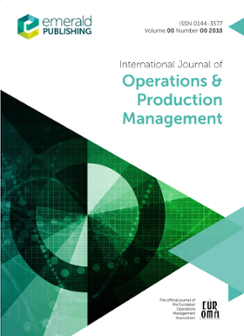2019冠状病毒病大流行如何影响并将影响运营和供应链管理的研究与实践
IF 7.4
2区 管理学
Q1 MANAGEMENT
International Journal of Operations & Production Management
Pub Date : 2021-08-19
DOI:10.1108/IJOPM-06-2021-902
引用次数: 14
摘要
目的——本文考虑新冠肺炎大流行如何影响运营和供应链管理(OSCM)的研究和实践。它还介绍了被选为2020年欧洲癌症联盟会议特刊的论文。设计/方法/方法-我们回顾了去年发生的突出事件,以确定OSCM中的新趋势和新研究问题。调查结果——我们发现,疫情有三种主要影响,因为它(1)加强了现有主题的重要性,如供应链合作;(2) 加快在各个领域采用某些做法,包括新产品开发和数字化转型;(3) 质疑一些方法,例如在波动和不确定性时期实施精益,并有机会进一步研究与复杂供应链、战略实施和人员管理有关的方法。原创性/价值-文章确定了实践中的重大变化,并提出了OSCM研究的研究议程。论文类型-研究论文。本文章由计算机程序翻译,如有差异,请以英文原文为准。
Editorial How the Covid-19 pandemic has affected, and will affect, operations and supply chain management research and practice
Purpose – This article considers how the Covid-19 pandemic has impacted research and practice in operations and supply chain management (OSCM). It also introduces the papers selected for the EurOMA 2020 conference special issue.
Design/methodology/approach – We review salient events occurred over the last year to identify emergent trends and novel research questions in OSCM.
Findings – We find that the pandemic has had three main types of implications, as it has (1) reinforced the importance of existing topics such as collaboration in supply chains; (2) accelerated the adoption of certain practices in various areas including new product development and digital transformation; (3) questioned some approaches, such as the implementation of lean in times of volatility and uncertainty, and giving the opportunity to investigate further ones in relation to complex supply chains, strategy implementation and people management.
Originality/value – The article identifies significant changes in practice and puts forward a research agenda for OSCM research.
Paper type - Research paper.
求助全文
通过发布文献求助,成功后即可免费获取论文全文。
去求助
来源期刊
CiteScore
13.30
自引率
17.20%
发文量
96
期刊介绍:
The mission of the International Journal of Operations & Production Management (IJOPM) is to publish cutting-edge, innovative research with the potential to significantly advance the field of Operations and Supply Chain Management, both in theory and practice. Drawing on experiences from manufacturing and service sectors, in both private and public contexts, the journal has earned widespread respect in this complex and increasingly vital area of business management.
Methodologically, IJOPM encompasses a broad spectrum of empirically-based inquiry using suitable research frameworks, as long as they offer generic insights of substantial value to operations and supply chain management. While the journal does not categorically exclude specific empirical methodologies, it does not accept purely mathematical modeling pieces. Regardless of the chosen mode of inquiry or methods employed, the key criteria are appropriateness of methodology, clarity in the study's execution, and rigor in the application of methods. It's important to note that any contribution should explicitly contribute to theory. The journal actively encourages the use of mixed methods where appropriate and valuable for generating research insights.

 求助内容:
求助内容: 应助结果提醒方式:
应助结果提醒方式:


